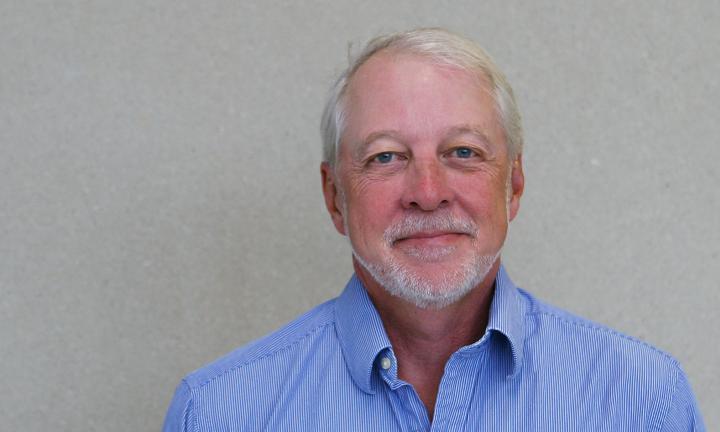UW oncologist studies how viruses cause cancer — and how we can better prevent them

Paul Lambert has received international recognition for his many contributions to understanding the role of HPV in cancer, leads three NIH research grants and edits the journal Virology. He says continued funding for research means “more effective therapies and greater understanding of how to fight cancer from every angle.”
Research at the University of Wisconsin–Madison drives innovation, saves lives, creates jobs, supports small businesses, and fuels the industries that keep America competitive and secure. It makes the U.S. — and Wisconsin — stronger. Federal funding for research is a high-return investment that’s worth fighting for. Learn more about the impact of UW–Madison’s federally funded research and how you can help protect it.
Paul Lambert leads the McArdle Laboratory for Cancer Research at University of Wisconsin–Madison where he has developed new anti-cancer therapies for cervical cancer and leads research to prevent and treat cancers caused by viral infections. Lambert, who also serves as chair of the Department of Oncology in the Wisconsin School of Medicine and Public Health, recently sat down for a Q&A about the importance of continued research on tumor viruses, which he says cause about 15% of all human cancers.
What is the focus of the project you’ve been leading, and why is it so important?
This grant, originally initiated over 46 years ago by Dr. Howard Temin, supports a collaborative program focused on viruses that cause human cancer. It’s one of the few such NIH Program Project grants in the U.S. dedicated to studying tumor viruses, which are responsible for approximately 15% of all human cancers worldwide. These include viruses like HPV (human papillomavirus), Epstein-Barr virus (EBV), hepatitis B and C and Kaposi’s sarcoma-associated herpesvirus (KSHV).
This work has not only deepened our understanding of cancer biology but also directly led to preventive strategies — like vaccines and potential therapies — that save lives.
What viruses are currently the focus of your research?
Today, our research centers on HPV, EBV and KSHV, though over the years we’ve also studied hepatitis B and C viruses and Merkel cell polyomavirus. These viruses cause a range of cancers including cervical, anal, penile, head and neck cancers, liver cancer and lymphomas. Our work seeks to understand how these viruses cause cancer and, just as importantly, how we can prevent or treat those cancers.
What are some major public health impacts of your work so far?
One of the biggest examples is HPV, which alone causes about 5% of all human cancers, and most of these are preventable through vaccination. For example, cervical cancer is one of the leading causes of cancer deaths in women worldwide, yet HPV vaccines can prevent the infections that lead to it. If widely implemented, this could save hundreds of thousands of lives annually. Unfortunately, vaccination rates remain low in many areas, especially in low-resource settings.
We’re also collaborating with the Gates Foundation to develop therapeutic vaccines for use in countries where access to advanced cancer treatments like radiation or chemotherapy is limited. So, the impact of our work stretches from the lab bench to global public health solutions.
How has this research contributed to other areas of cancer science?
Our work on tumor viruses has had profound implications beyond virus-related cancers. For example, studies of HPV’s cancer-causing proteins led to the discovery of key tumor suppressors like p53, which is now known to be the most commonly mutated gene in all human cancers. Our research also uncovered mechanisms of immune evasion used by HPV — mechanisms now known to contribute to resistance to immunotherapy across many types of cancer.
Have your findings led to clinical applications or trials?
Yes. One exciting example is a clinical trial underway at UW–Madison for patients at risk of anal cancer caused by HPV. This work was inspired by basic science from Dr. Nathan Sherer’s lab (focused on HIV) and research from Dr. Evie Carchman, a GI surgeon. They discovered that HIV protease inhibitors, originally used to manage HIV, could also kill HPV-positive cancer cells. Now, these drugs are being repurposed in a trial to help prevent cancer in high-risk patients. It’s a great example of how basic lab research can translate directly into patient care.
What challenges has your research faced recently, particularly around funding?
We recently experienced a seven-week delay in funding renewal, which created significant disruption. We had to pause high-cost genomic studies and animal model work, delaying some projects by months, not just weeks. While funding did eventually come through at expected levels, it highlighted how vulnerable large research programs are to even short-term interruptions. These pauses can stall progress on experiments that take years to complete — especially when working with live models or time-sensitive tissue studies.
What’s the next frontier in your research?
We’re now working on developing novel therapeutics and vaccines for viruses like HPV, especially in settings where conventional treatments are inaccessible. We’re also deepening our understanding of how viruses interact with host cells and how those mechanisms might be exploited for broader cancer therapies. Ultimately, the goal is not just to understand how cancer happens — but to stop it before it starts.
If there’s one takeaway the public should know about your work, what is it?
Many of the cancers we study are preventable. That’s the key message. Whether it’s through vaccination, treatment of viral infections, or better public health outreach, we have the tools — or are developing them — to reduce cancer risk dramatically. Continued investment in this research means more lives saved, more effective therapies and greater understanding of how to fight cancer from every angle.
Tags: cancer, federal relations, research




